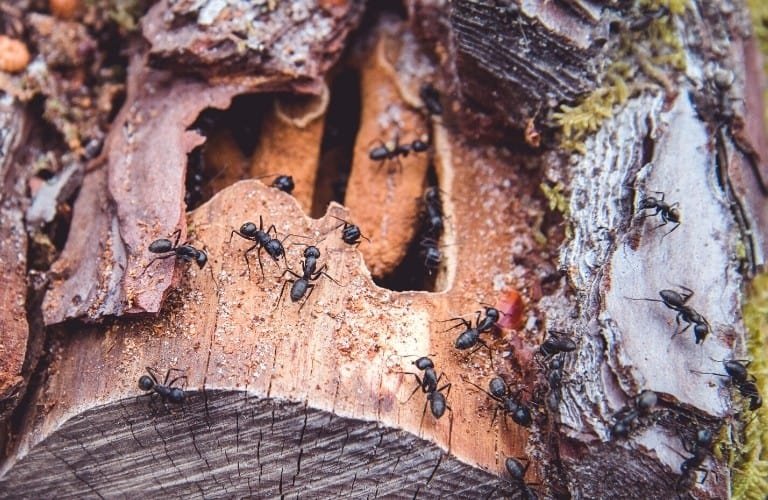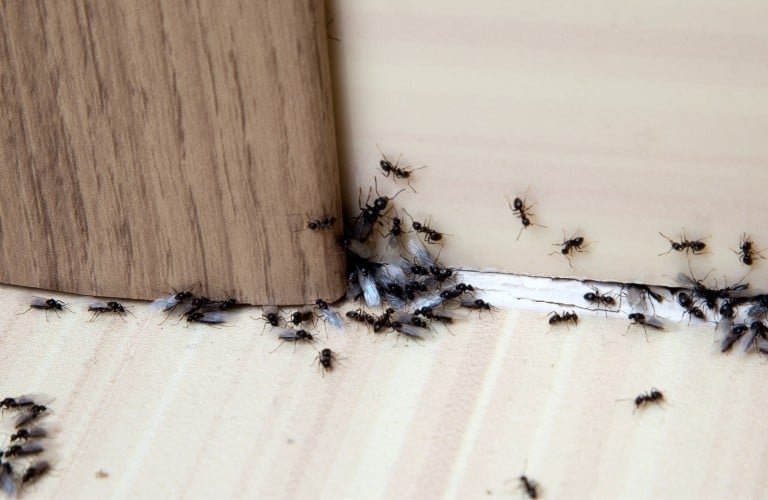Humans depend on a good night’s sleep to function correctly and have a productive day. But what about the world’s most productive member of society – the ant?
Do ants sleep? Ants do sleep, but because they do not have eyelids and monitoring their brain activity isn’t possible, it’s hard to spot a sleeping ant. Worker ants take over 200 one-minute naps per day, while queens sleep in six-minute intervals for up to nine hours per day.
The sleep patterns and needs are different between the worker and queen ants. Let’s take a closer look at how each one functions within the ant colony.
Have a problem with ants constantly invading your home or yard? See all our ant articles to you find the best prevention guidelines and elimination tactics as well as lots of little-known facts about these industrious workers.
A Day in the Life of Ants
An ant’s life is pretty straightforward: each type of adult has its specific purpose and duties within the colony that they have to fulfill.
Queens
Queen ants are born with wings so they can go out and find a male to mate with.
Once she has mated, she can either join another ant colony that already has a queen or two, or she can begin digging her own anthill to make her own colony.
From there, she will spend the rest of her life laying eggs and caring for larvae.
Males
Once adult males emerge from the pupae, they leave the nest to find queens to mate with.
They swarm with other males (yes, males have wings – learn more here) and leave pheromones to attract queens.
Males only live for a few weeks and will die shortly after mating.
Workers
Worker ants are all females, and their jobs include foraging for food, bringing food back to the nest, and feeding larvae.
When necessary, they’ll defend the queen from predators.
Ants are constantly working around the clock to do their job to make sure every task is taken care of, and there are no vacation days.
Fun fact: Homes are typically invaded by one of two ant types – sugar ants or protein ants. Both of these terms broadly refer to several species of ants and are so called based upon their food preferences.
Do Ants Get Tired?
Even hard-working ants need to rest. Ants will periodically remain still and not do anything.
This is assumed to be “taking a break from work” and is referred to as being in a state of torpor.
Many animals and insects go into torpor to conserve energy when food levels are low. It’s believed that ants do this when there’s a lull in work to do.
Some ant species can’t work in extreme cold or heat.
If there are harsh winters, they’ll hibernate until it’s warm again. If it’s too hot, ants will do minimal work during the day and work more at night.
They also combat the heat by working underground and then emerging above ground to forage at night.
Did you know? Ants are incredibly beneficial to our environment. They aid in soil aeration, decomposition, and even seed dispersal. Check out this article to see how else they serve our planet.
Ant Sleep Patterns
Ants don’t sleep as humans do. They live incredibly busy lives and must protect the queen at all costs, so they have minimal time to sleep.
Ants will only sleep for a few minutes at a time if even that. The amount of sleep an ant needs depends on whether it’s a worker or a queen.
The queen needs much more than workers do since she’s responsible for laying eggs.
Queen Ants
The queen ant sleeps for about nine hours each day, but it’s not all at once. Instead, she sleeps for about six minutes at a time several times throughout the day.
This allows the queen to save energy so she can have enough later to lay eggs.
Queens appear to have two different ways of sleeping: dozing and deep sleep.
When they “doze,” their antennae are slightly raised, and their mouths are held open.
When they’re in a deeper sleep, however, their antennae are lowered, and they keep their mouth closed.
Not much is understood about a queen’s sleeping habits, but it’s likely that queens dream when they’re in a deep sleep.
The reasoning why a queen goes into a deep sleep versus just a doze is unclear.
Whether it’s light or deep, it will remain about six minutes in duration for a total of about nine hours each day.
It’s assumed that queens live longer lives because of the amount of sleep they get.
Of course, their long life can also be attributed to their underground lifestyle and the protection they receive from worker ants.
Worker Ants
Worker ants get a lot less sleep than the queens do. They get almost five hours of sleep each day. Again, they don’t get all of this sleep at once.
They sleep for about a minute at a time and will stop to take these snoozes several times throughout the day.
The workers must protect the queen and forage for food, which are jobs that require constant work around the clock.
The worker ants stagger their naps and won’t sleep at the same time as others.
It’s thought that about 80% of the workers in a colony are working at any given time – the remaining 20% are snoozing and saving energy to keep working, but only for a minute at a time.
The lack of sleep could be the reason why workers live for only a fraction of the queen’s lifespan.
Depending on the species, queens can live anywhere from three – 30 years, and workers can live for just a few weeks or up to three years.
Where Do Ants Sleep?
Ants don’t have designated sleep chambers in their anthills, which makes sense when you consider they only sleep for a minute at a time.
Instead of going to the bedroom, they get out of the way from the other ants to doze.
They’ll move off to the side of the trail or in the tunnels in the anthill to catch a quick nap.
Day or Night – Do Ants Care?
Ants don’t pay attention to the time of day and don’t usually receive enough sunlight to affect their circadian rhythm.
Ants often go a few days without sunlight when they’re working underground, so they’re able to snooze throughout the day without being influenced by the amount of sunlight they receive.
Even though ants don’t sleep according to the time of day, there are still some nocturnal species that are more productive at night.
Carpenter ants are well known for being nocturnal. They spend the majority of the day in the anthill and come out at night to forage.
Whether you’re seeing more ants during daylight hours or after the sun sets, the elimination methods will be the same.
We have a complete guide to getting rid of pesky ants that outlines prevention methods and eradication strategies, including effective pesticide options. Check it out here.
How to Get Rid of Nocturnal Ants
Getting rid of nocturnal ants isn’t much different than getting rid of ants that work during the day – it’s mostly just the timing that’s different.
Locating
First, you need to locate where exactly they’re coming from. Wait until the sun sets before you start to search for them.
You can turn on the lights in your home or use a flashlight. They most likely won’t run away just because there’s a light present.
If you have carpenter ants, it’s possible that the main nest is in your home. These ants chew holes into wood and will use it as their nest.
However, it’s possible that the main nest is elsewhere, and they’re just using your home for satellite nests.
If this is the case, then getting rid of the satellite nest will only offer you a temporary solution.
Other ant species will also build nests in your home. If they aren’t carpenter ants, it’s possible that they’ll build a traditional anthill inside the walls or in a basement or attic.
Elimination
Once you’ve spotted where the ants are coming from, you can begin to fight them off. You can use natural remedies or pesticides.
Just be careful when approaching them because as you may have already learned the hard way, ants can bite (and sting). Click here to learn which ants produce the most painful bites and stings.
Natural remedies are generally safe to use around children or pets, so if you have either of those, natural is the best way to go.
Pesticides are harmful because of the chemicals, so you should be cautious when using them.
To see what products we recommend for killing ants, both natural and chemical, head over to this article.
Boric acid is the most effective natural remedy. It’s a naturally occurring poison that will kill the ants shortly after they consume it.
Although it’s natural, you should still keep it away from children and pets, and be careful not to ingest or breathe it in.
Mix boric acid (this one is 99.9% pure) with either sugar and water or honey (maple syrup also works) until it makes a paste.
Leave it out for the ants to eat, and over time they’ll die off. If you continue to provide this mixture, the queen will eventually die after the workers have brought it back to her to eat.
There are also pesticide versions of this boric acid trap that come in convenient, disposable containers, like these prebaited ready-to-use traps.
The trap and bait method is probably the best way to kill ants if they’re living in the walls. It can be difficult to kill these ants since they’re so hard to reach.
Final Thoughts
It may seem like ants never sleep, but they actually do. Their sleeping patterns don’t affect their productivity, so there isn’t really one specific time to try to get rid of them.
Nocturnal ants spend most of the daylight hours underground, so they’re easier to find at night.





